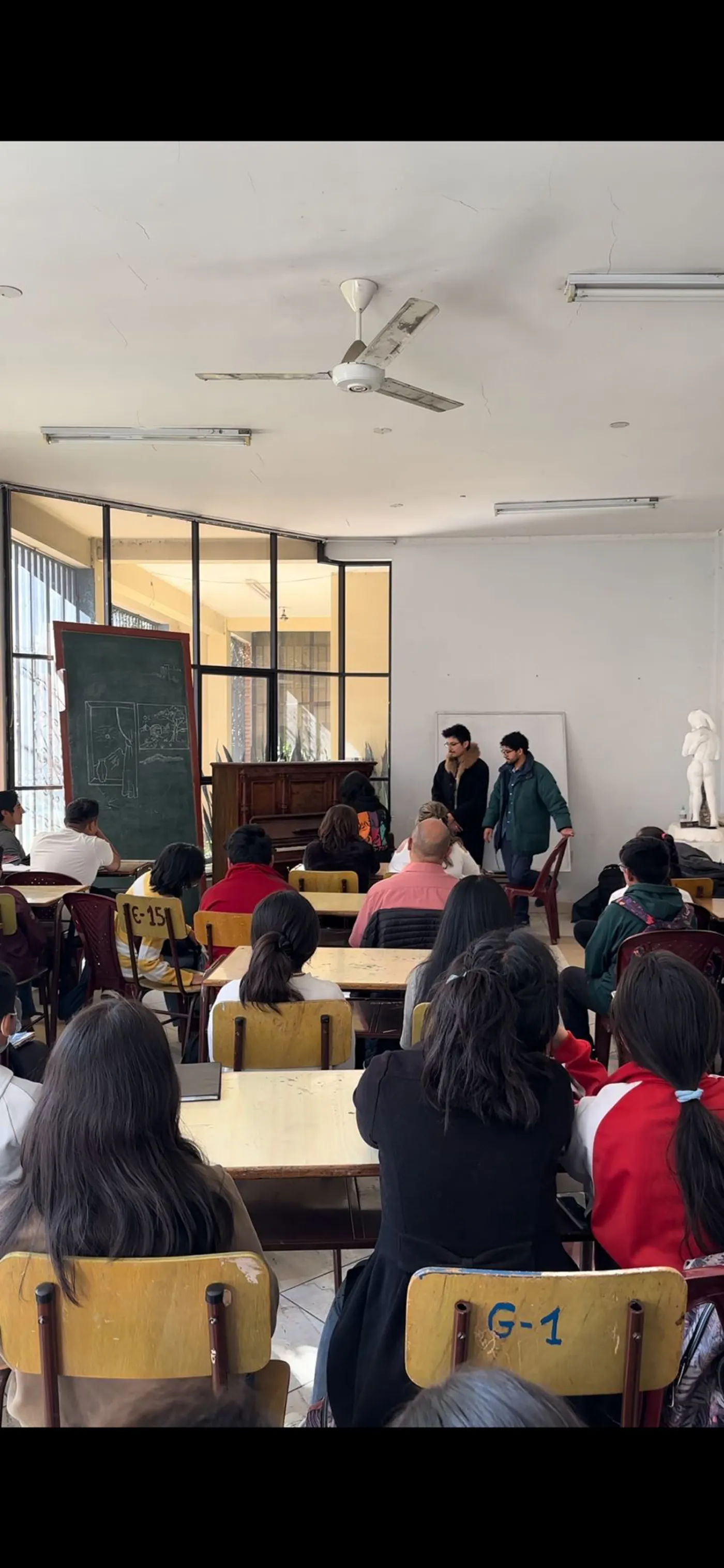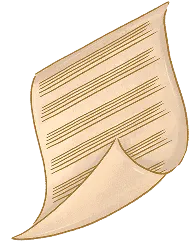
MÚSICA INMORTAL

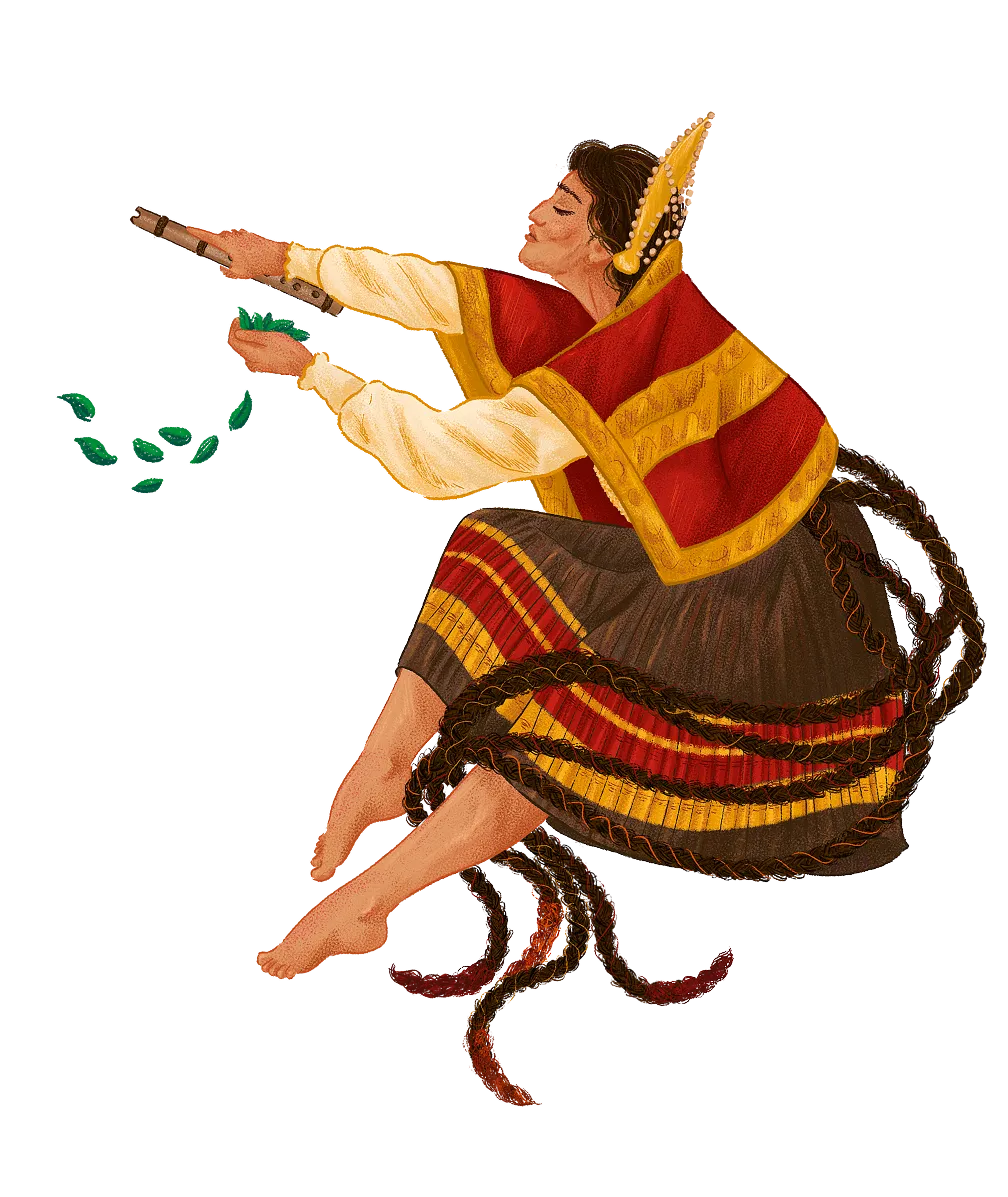
“Muy grata la noticia de estos conciertos en que se relievará la Forma Musical actualmente casi extinta del YARAVÍ. Tan poética y tan gustada otrora, a través de un serio estudio del joven músico boliviano Pablo Cáceres Aranibar y la participación pianística de otro artista nuestro: Fernando López Flores, ambos radicados en el exterior.”

ABOUT
(ES) MÚSICA INMORTAL es un proyecto cultural y educativo sin fines de lucro que tiene como objetivo rescatar, revalorizar y difundir la música clásica boliviana del siglo XIX, con un énfasis especial en el yaraví, uno de los géneros más profundos y representativos de la identidad musical del país.
(EN) MÚSICA INMORTAL (IMMORTAL MUSIC) is a non-profit cultural and educational project aimed at rescuing, revaluing, and promoting 19th-century Bolivian classical music, with a special emphasis on the yaraví, one of the most profound and representative genres of the country’s musical identity.
(DE) MÚSICA INMORTAL (UNSTERBLICHE MUSIK) ist ein gemeinnütziges Kultur- und Bildungsprojekt mit dem Ziel, die klassische bolivianische Musik des 19. Jahrhunderts wiederzuentdecken, aufzuwerten und zu verbreiten – mit besonderem Schwerpunkt auf dem Yaraví, einem der tiefgründigsten und repräsentativsten Musikgenres der nationalen Identität.
(ES) Esta iniciativa busca no solo recuperar un legado poco conocido, sino también proyectarlo al mundo, conectando a nuevas generaciones con su patrimonio a través de una propuesta artística y pedagógica de alto nivel.
(EN) This initiative seeks not only to recover a little-known legacy, but also to share it with the world, connecting new generations with their heritage through a high-level artistic and pedagogical proposal.
(DE) Diese Initiative möchte nicht nur ein wenig bekanntes Erbe bewahren, sondern es auch in die Welt hinaustragen und neue Generationen durch ein künstlerisch und pädagogisch anspruchsvolles Konzept mit ihrem kulturellen Erbe verbinden.


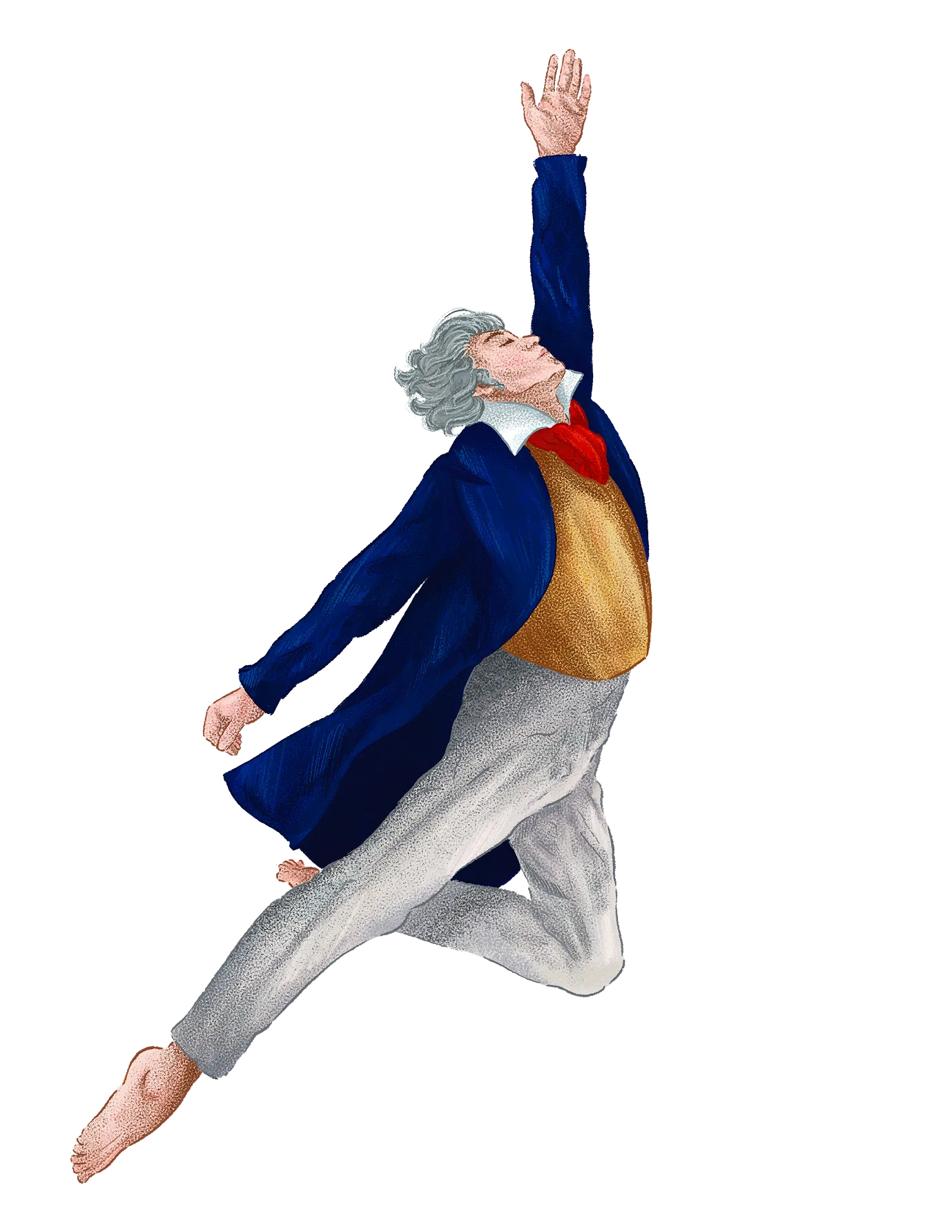

“Fue una hermosa experiencia. Solo escuchar la música pudo haber sido lindo, pero la forma en la que se interpretó la música me hizo añorar aquello que nunca conocí. Me trajeron a mí y mi familia reminiscencias de sentimientos guardados en nuestros huesos. No pude evitar imaginarme en ese salón bailando, festejando el fin de la guerra, entre palmas y la esperanza de que el país será mejor mañana. Gracias por traernos esos recuerdos que nunca tuvimos.”
CALENDAR
MÚSICA INMORTAL BICENTENARIO (2025)
(ES) En junio y julio de 2025, el ensamble suizo Epigonos Musicus/Tonkünstler, junto a músicos internacionales, realizará una gira en Suiza y Bolivia, presentando dos programas con obras inéditas del siglo XIX.
ENTRE LOS ALPES Y LOS ANDES – Música suiza y boliviana interpretada con instrumentos históricos.
ENTRE BACH Y LOS ANDES – Música boliviana junto a J. S. Bach, equiparando su valor artístico.
(EN) In June and July 2025, the Swiss ensemble Epigonos Musicus/Tonkünstler, together with international musicians, will tour Switzerland and Bolivia, presenting two programs featuring previously unpublished 19th-century works.
BETWEEN THE ALPS AND THE ANDES – Swiss and Bolivian music performed on historical instruments.
BETWEEN BACH AND THE ANDES – Bolivian music alongside J. S. Bach, equal in artistic value.
(DE)
Im Juni und Juli 2025 wird das Schweizer Ensemble Epigonos Musicus/Tonkünstler gemeinsam mit internationalen Musikerinnen und Musikern eine Tournee durch die Schweiz und Bolivien unternehmen und zwei Programme mit bislang unveröffentlichten Werken des 19. Jahrhunderts präsentieren.
ZWISCHEN DEN ALPEN UND DEN ANDEN – Schweizerische und bolivianische Musik auf historischen.
ZWISCHEN BACH UND DEN ANDEN – Bolivianische Musik neben J. S. Bach, ihrem künstlerischen Wert ebenbürtig.
(ES) Las clases magistrales estarán dirigidas a músicos de todos los niveles, desde principiantes hasta profesionales, con el objetivo de redescubrir y promover la interpretación histórica y el repertorio boliviano, además de compartir experiencias de los Maestros como estudiantes y como músicos profesionales. Al final de cada clase magistral, se hará la composición grupal de una cueca con un “juego de dados musical” titulado Boliviamanta Cuecasniyku Ad Infinitum, compuesto por Pablo Cáceres Aranibar.
(EN) The masterclasses are open to musicians of all levels, from beginners to professionals, with the aim of rediscovering and promoting historical performance and Bolivian repertoire, as well as sharing the Masters’ experiences as students and as professional musicians. At the end of each masterclass, participants will collectively compose a cueca using a “musical dice game” titled Boliviamanta Cuecasniyku Ad Infinitum, composed by Pablo Cáceres Aranibar.
(DE) Die Meisterkurse richten sich an Musikerinnen und Musiker aller Niveaus – von Anfängern bis hin zu Profis – mit dem Ziel, die historische Aufführungspraxis und das bolivianische Repertoire neu zu entdecken und zu fördern sowie die Erfahrungen der Meister sowohl als Studierende als auch als professionelle Musiker zu teilen.
Am Ende jedes Meisterkurses wird gemeinsam eine Cueca komponiert – mithilfe eines „musikalischen Würfelspiels“ mit dem Titel Boliviamanta Cuecasniyku Ad Infinitum, komponiert von Pablo Cáceres Aranibar.
“Fue una hermosa experiencia. Solo escuchar la música pudo haber sido lindo, pero la forma en la que se interpretó la música me hizo añorar aquello que nunca conocí. Me trajeron a mí y mi familia reminiscencias de sentimientos guardados en nuestros huesos. No pude evitar imaginarme en ese salón bailando, festejando el fin de la guerra, entre palmas y la esperanza de que el país será mejor mañana. Gracias por traernos esos recuerdos que nunca tuvimos.”
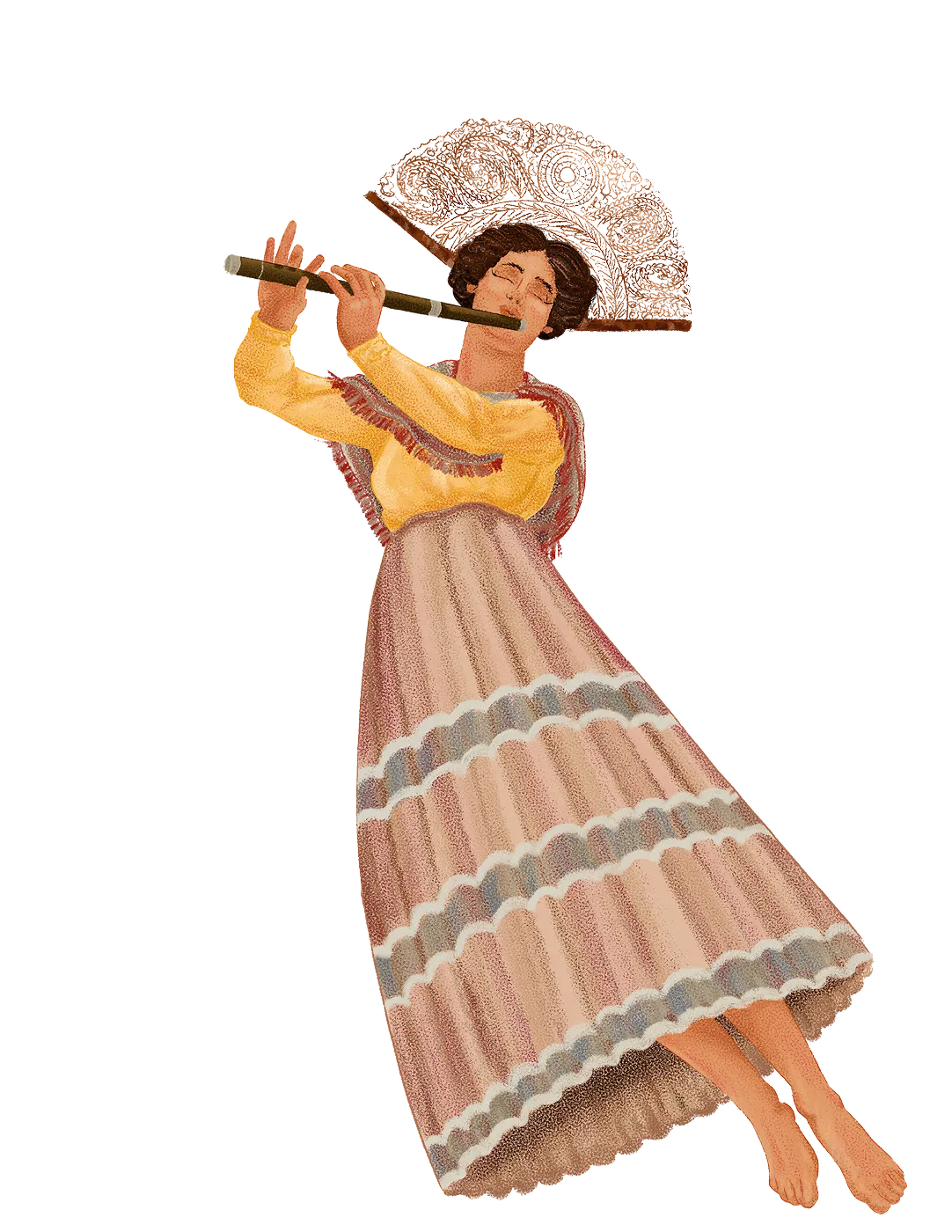


Artists
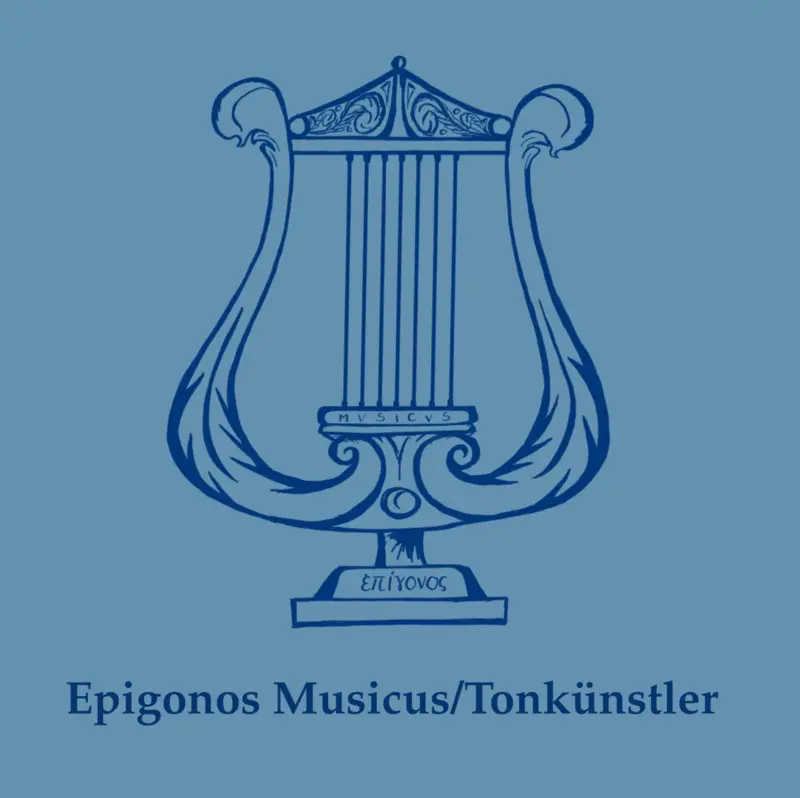
(ES) El Ensemble Epigonos Musicus/Tonkünstler fue fundado por Pablo Cáceres Aranibar, contrabajista, cantante, director de orquesta y compositor especializado en práctica históricamente informada. El grupo debutó el 13 de abril de 2018 en la Schola Cantorum Basiliensis como orquesta de cámara (16 miembros) y varía su instrumentación entre ensamble de cámara y orquestal según el repertorio. Actualmente, su enfoque principal es la música de finales del siglo XVIII y del siglo XIX, aunque también interpreta música de los siglos XVI, XVII y barroco virreinal latinoamericano, destacando la recuperación de obras de Pedro Ximenez Abrill Tirado y la música nacional suiza del siglo XIX.
El nombre del conjunto refleja su filosofía: “epígonos” (del griego ἐπίγονος) se refiere a quienes continúan la tradición de generaciones anteriores, y “Musicus” o “Tonkünstler” alude a los que se dedican al arte de la música ("Tonkunst"). Así, el ensemble se dedica a la (re)interpretación de la música del pasado, utilizando instrumentos históricos y buscando reconstruir las expectativas originales de los compositores.
(EN) The Epigonos Musicus/Tonkünstler ensemble was founded by Pablo Cáceres Aranibar, a double bassist, singer, conductor, and composer specializing in historically informed performance. The group made its debut on April 13, 2018, at the Schola Cantorum Basiliensis as a chamber orchestra (16 members), and adapts its instrumentation—ranging from chamber ensemble to full orchestra—depending on the repertoire. Currently, its main focus is on music from the late 18th and 19th centuries, although it also performs music from the 16th and 17th centuries and Latin American viceregal Baroque, with a special emphasis on the revival of works by Pedro Ximenez Abrill Tirado and 19th-century Swiss national music.
The ensemble’s name reflects its philosophy: “Epigonos” (from the Greek ἐπίγονος) refers to those who continue the tradition of previous generations, and “Musicus” or “Tonkünstler” refers to those dedicated to the art of music (“art of sound”). Thus, the ensemble is devoted to the (re)interpretation of music from the past, using historical instruments and striving to reconstruct the original expectations of the composers.
(DE) Das Ensemble Epigonos Musicus/Tonkünstler wurde von Pablo Cáceres Aranibar gegründet, einem Kontrabassisten, Sänger, Dirigenten und Komponisten, der sich auf historisch informierte Aufführungspraxis spezialisiert hat. Das Ensemble debütierte am 13. April 2018 an der Schola Cantorum Basiliensis als Kammerorchester (16 Mitglieder) und variiert seine Besetzung je nach Repertoire zwischen Kammerensemble und Orchester. Derzeit liegt der Schwerpunkt auf Musik des späten 18. und des 19. Jahrhunderts, wobei auch Werke aus dem 16. und 17. Jahrhundert sowie der lateinamerikanischen Vizekönigsbarockmusik aufgeführt werden – mit besonderem Fokus auf die Wiederentdeckung von Kompositionen von Pedro Ximenez Abrill Tirado und der schweizerischen Nationalmusik des 19. Jahrhunderts.
Der Name des Ensembles spiegelt seine Philosophie wider: „Epigonos“ (vom Griechischen ἐπίγονος) bezeichnet diejenigen, die die Tradition vorhergehender Generationen fortführen, während „Musicus“ oder „Tonkünstler“ sich auf Menschen bezieht, die sich der Tonkunst widmen. Das Ensemble widmet sich somit der (Neu-)Interpretation vergangener Musik unter Verwendung historischer Instrumente und mit dem Ziel, die ursprünglichen Klangvorstellungen der Komponisten nachzuvollziehen.
.webp)
(ES)Fernando López Flores (1994) es un pianista y gestor cultural boliviano radicado en Estados Unidos. Estudió piano en la Florida Gulf Coast University, donde actualmente cursa una Maestría en Emprendedurismo. Ha colaborado con una amplia variedad de artistas, desde músicos clásicos hasta poetas y bailarines, y es Director Musical de la Iglesia Luterana “Peace” en Naples (Florida), miembro de la Sociedad Boliviana de Música de Cámara y director del B World Music Ensemble, que difunde música misional boliviana en escenarios estadounidenses.
Es cofundador de la reconocida iniciativa Música Para Respirar, que ofreció más de 4000 conciertos virtuales gratuitos durante la pandemia, alcanzando a más de 15 000 oyentes en 50 países y contando con la participación de músicos de renombre internacional.
López Flores es también creador de The Music Forest, una instalación sonora en los jardines botánicos del suroeste de Florida, donde une naturaleza, salud mental y música clásica en colaboración con músicos y musicoterapeutas. Su labor artística y social ha llevado repertorios de música clásica y del mundo a diversos espacios en Bolivia y Estados Unidos, incluyendo el Faena Theatre de Miami y el Carnegie Hall de Nueva York.
(EN) Fernando López Flores (1994) is a Bolivian pianist and cultural entrepreneur based in the United States. He studied piano at Florida Gulf Coast University, where he is currently pursuing a Master’s degree in Entrepreneurship. His projects span collaborations with a wide range of artists, from classical musicians to poets and dancers. He serves as Music Director at Peace Lutheran Church in Naples, Florida, is a member of the Bolivian Chamber Music Society, and directs the B World Music Ensemble, which brings Baroque music from San Ignacio de Moxos (Bolivia) to U.S. audiences.
He is co-founder of the acclaimed initiative Música Para Respirar, which delivered over 4,000 free virtual concerts during the pandemic, reaching more than 15,000 listeners in 50 countries and involving musicians from major orchestras worldwide.
López Flores is also the creator of The Music Forest, a sound installation in the botanical gardens of Southwest Florida that connects nature, mental health, and music through interactive performances with musicians and music therapists. His artistic and social work has brought classical and world music to churches, health centers, orphanages, nursing homes, and universities in Bolivia and the U.S., as well as prestigious venues such as the Faena Theatre in Miami and Carnegie Hall in New York.
(DE) Fernando López Flores (1994) ist ein bolivianischer Pianist und Kulturschaffender mit Wohnsitz in den USA. Er studierte Klavier an der Florida Gulf Coast University, wo er derzeit einen Masterstudiengang in Entrepreneurship absolviert. Seine Projekte ermöglichen die Zusammenarbeit mit Künstlerinnen und Künstlern unterschiedlichster Disziplinen – von klassischen Musikern bis hin zu Dichtern und Tänzern. Er ist Musikdirektor der Peace Lutheran Church in Naples (Florida), Mitglied der Bolivianischen Gesellschaft für Kammermusik und leitet das B World Music Ensemble, das barocke Musik aus San Ignacio de Moxos (Bolivien) in den USA aufführt.
Er ist Mitbegründer der renommierten Initiative Música Para Respirar, die während der Pandemie über 4.000 kostenlose virtuelle Konzerte veranstaltete, mehr als 15.000 Zuhörer in 50 Ländern erreichte und Musikerinnen und Musiker führender Orchester der Welt einbezog.
López Flores ist zudem Schöpfer von The Music Forest, einer Klanginstallation in den Botanischen Gärten im Südwesten Floridas, die Natur, mentale Gesundheit und Musik durch interaktive Aufführungen mit Musiker:innen und Musiktherapeut:innen vereint. Sein künstlerisches und soziales Engagement hat klassische Musik und Weltmusik an Kirchen, Gesundheitszentren, Waisenhäuser, Pflegeheime, Universitäten sowie renommierte Bühnen wie das Faena Theatre in Miami und die Carnegie Hall in New York gebracht.
(ES) Kevin Bourdat (1993) es un violonchelista y violagambista francés con un enfoque multidisciplinario que abarca desde la música antigua hasta la contemporánea. Tras obtener una licenciatura en violonchelo moderno en la Académie Supérieure de Musique de Strasbourg bajo la enseñanza de Eva Boecker, decidió especializarse en interpretación histórica. Estudió violonchelo barroco con Christophe Coin y viola da gamba con Paolo Pandolfo en la Schola Cantorum Basiliensis, donde completó una maestría en 2019. Su pasión por la música de cámara lo llevó a formar parte del Quinteto Le Bateau Ivre, que recibió un Diapason Découverte por su primer CD Marionnettes y ganó la medalla de plata en el Concurso Internacional de Música de Cámara de Osaka en 2023. Kevin es profesor de violonchelo barroco en el Conservatorio de Estrasburgo y de viola da gamba en el Conservatorio de Nancy, donde comparte su pasión por la enseñanza. También participa en proyectos innovadores como el Philharmonicoeur y las Forces Majeures. Con una profunda sensibilidad hacia el diálogo cultural, colabora con el ensemble Double Face y otros proyectos que buscan unir diversas tradiciones musicales. Kevin sigue desarrollando su carrera artística a través de la la creación de proyectos que fusionan distintas épocas y estilos musicales.
(EN) Kevin Bourdat (1993) is a French cellist and viola da gamba player with a multidisciplinary approach that ranges from early to contemporary music. After obtaining a bachelor's degree in modern cello from the Académie Supérieure de Musique de Strasbourg under the tutelage of Eva Boecker, he decided to specialize in historical performance practice. He studied Baroque cello with Christophe Coin and viola da gamba with Paolo Pandolfo at the Schola Cantorum Basiliensis, where he completed a master's degree in 2019. His passion for chamber music led him to join the Quintet Le Bateau Ivre, which received a Diapason Découverte for their first CD Marionnettes and won the silver medal at the Osaka International Chamber Music Competition in 2023. Kevin is a professor of Baroque cello at the Conservatoire de Strasbourg and of viola da gamba at the Conservatoire de Nancy, where he shares his passion for teaching. He also participates in innovative projects such as Philharmonicoeur and Forces Majeures. With a deep sensitivity to cultural dialogue, he collaborates with the ensemble Double Face and other projects that seek to unite diverse musical traditions. Kevin continues to develop his artistic career through the creation of projects that fuse different eras and musical styles.
(DE) Kevin Bourdat (1993) ist ein französischer Cellist und Gambist mit einem multidisziplinären Ansatz, der von Alter bis zur zeitgenössischen Musik reicht. Nach seinem Bachelor-Abschluss in modernem Cello an der Académie Supérieure de Musique de Strasbourg bei Eva Boecker entschied er sich für eine Spezialisierung auf historische Aufführungspraxis. Er studierte Barockcello bei Christophe Coin und Viola da Gamba bei Paolo Pandolfo an der Schola Cantorum Basiliensis, wo er 2019 einen Master-Abschluss erwarb. Seine Leidenschaft für Kammermusik führte ihn zum Quintett Le Bateau Ivre, das für seine erste CD Marionnettes ein Diapason Découverte erhielt und 2023 die Silbermedaille beim Internationalen Kammermusikwettbewerb Osaka gewann. Kevin ist Professor für Barockcello am Conservatoire de Strasbourg und für Viola da Gamba am Conservatoire de Nancy, wo er seine Leidenschaft für das Unterrichten teilt. Er beteiligt sich auch an innovativen Projekten wie dem Philharmonicoeur und den Forces Majeures. Mit einer tiefen Sensibilität für den kulturellen Dialog arbeitet er mit dem Ensemble Double Face und anderen Projekten zusammen, die darauf abzielen, verschiedene musikalische Traditionen zu verbinden. Kevin entwickelt seine künstlerische Karriere durch die Schaffung von Projekten weiter, die verschiedene Epochen und Musikstile miteinander verschmelzen.
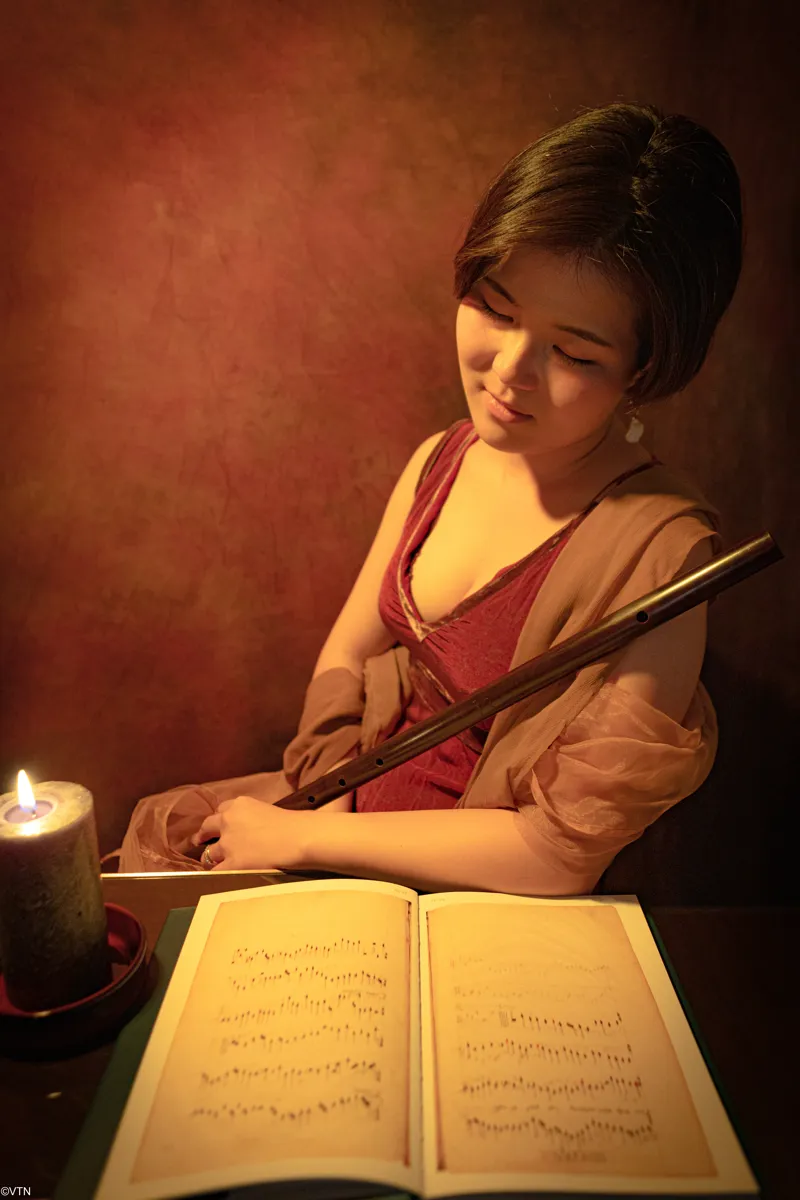
(ES) Miyuki Okumura (1991), flautista japonesa-francesa, se especializa en la interpretación histórica desde la música medieval hasta la contemporánea. Se graduó en flauta moderna en la Universidad Ueno Gakuen de Tokio y, fascinada por la flauta francesa del siglo XX, se trasladó a Francia en 2014 para profundizar en este repertorio. Desde entonces, ha sido invitada a festivales de música por toda Europa y ha colaborado con destacados conjuntos. En 2020, completó su máster en la Haute École des Arts du Rhin de Estrasburgo bajo la dirección de Silvia Careddu. Además, en 2023, terminó sus estudios de música antigua en la Schola Cantorum Basiliensis con Marc Hantaï. Miyuki ha recibido varios premios internacionales, incluido un galardón especial en el concurso de París en 2019, tras el cual fue invitada a actuar en el prestigioso festival “Rencontres Internationales de la Harpe en Île-de-France”. Como solista, ha actuado con la Orquesta Sinfónica de Kyushu y el Ensemble Est, entre otros. Es cofundadora del ensemble Auditu Dignum, ganador del primer premio del Concurso Biagio Marini en 2024. En 2025, impartirá una clase magistral sobre la disminución en la música renacentista en el Conservatorio de Montluçon. Su carrera combina una profunda comprensión histórica con un enfoque versátil que le ha permitido actuar en diversos escenarios y compartir su conocimiento a través de la enseñanza.
(EN) Miyuki Okumura (1991), a Japanese-French flautist, specializes in historical performance from medieval to contemporary music. She graduated in modern flute from the Ueno Gakuen University in Tokyo and, fascinated by the 20th-century French flute, moved to France in 2014 to deepen her knowledge of this repertoire. Since then, she has been invited to music festivals throughout Europe and has collaborated with leading ensembles. In 2020, she completed her master's degree at the Haute École des Arts du Rhin in Strasbourg under the guidance of Silvia Careddu. Additionally, in 2023, she finished her studies in early music at the Schola Cantorum Basiliensis with Marc Hantaï. Miyuki has received several international awards, including a special prize at the Paris competition in 2019, after which she was invited to perform at the prestigious "Rencontres Internationales de la Harpe en Île-de-France" festival. As a soloist, she has performed with the Kyushu Symphony Orchestra and Ensemble Est, among others. She is co-founder of the ensemble Auditu Dignum, winner of the first prize at the Concorso Biagio Marini in 2024. In 2025, she will give a masterclass on diminution in Renaissance music at the Conservatoire de Montluçon. Her career combines a deep historical understanding with a versatile approach that has allowed her to perform in various settings and share her knowledge through teaching.
(DE) Miyuki Okumura (1991), eine japanisch-französische Flötistin, ist spezialisiert auf historische Aufführungspraxis von der mittelalterlichen bis zur zeitgenössischen Musik. Sie absolvierte ihr modernes Flötenstudium an der Ueno Gakuen Universität in Tokio und zog, fasziniert von der französischen Flöte des 20. Jahrhunderts, 2014 nach Frankreich, um dieses Repertoire zu vertiefen. Seitdem wurde sie zu Musikfestivals in ganz Europa eingeladen und hat mit bedeutenden Ensembles zusammengearbeitet. Im Jahr 2020 schloss sie ihren Master an der Haute École des Arts du Rhin in Straßburg unter der Leitung von Silvia Careddu ab. Darüber hinaus beendete sie 2023 ihr Studium der Alten Musik an der Schola Cantorum Basiliensis bei Marc Hantaï. Miyuki hat mehrere internationale Preise erhalten, darunter eine besondere Auszeichnung beim Wettbewerb in Paris im Jahr 2019, woraufhin sie zum renommierten Festival „Rencontres Internationales de la Harpe en Île-de-France“ eingeladen wurde. Als Solistin trat sie unter anderem mit dem Kyushu Symphony Orchestra und dem Ensemble Est auf. Sie ist Mitbegründerin des Ensembles Auditu Dignum, das 2024 den ersten Preis beim Concorso Biagio Marini gewann. Im Jahr 2025 wird sie am Conservatoire de Montluçon eine Meisterklasse über Diminution in der Renaissancemusik geben. Ihre Karriere verbindet ein tiefes historisches Verständnis mit einem vielseitigen Ansatz, der es ihr ermöglicht hat, in verschiedenen Kontexten aufzutreten und ihr Wissen durch Lehre weiterzugeben.
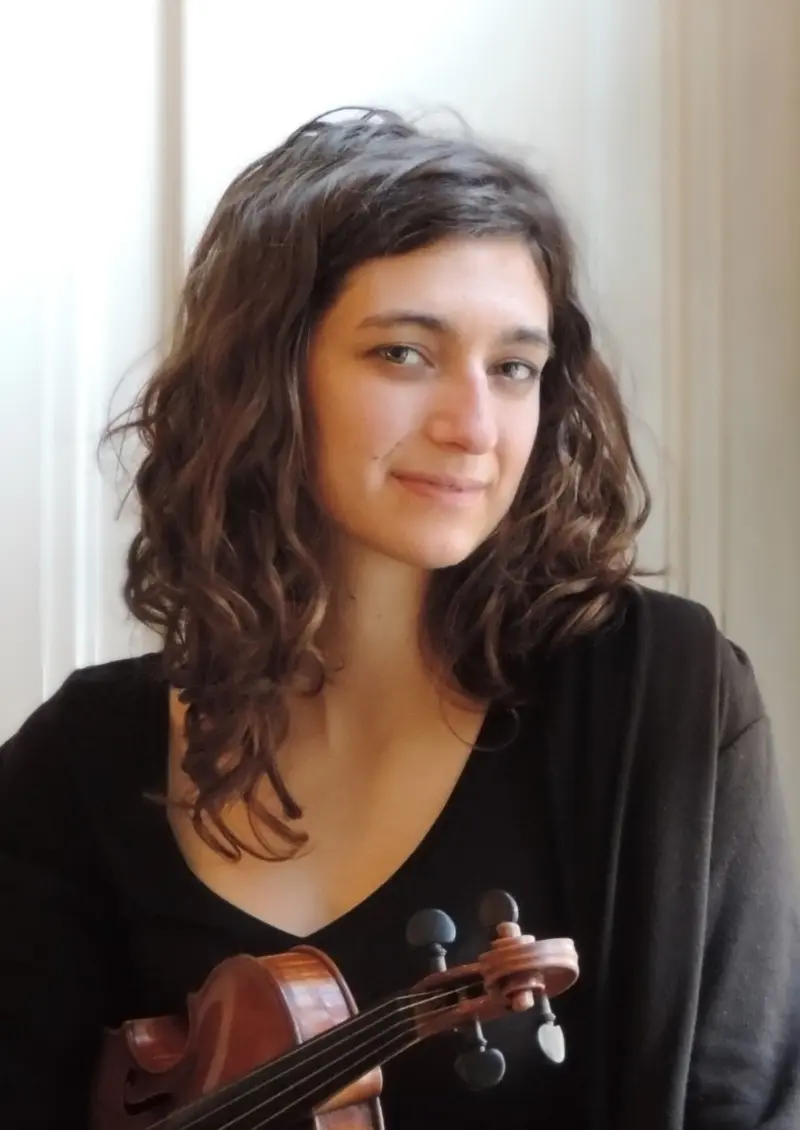
(ES) Natalie Carducci (1986) es una violinista italoestadounidense con una amplia trayectoria internacional y un enfoque especial en las prácticas interpretativas históricas. Se ha presentado con conjuntos como Gli Incogniti, Sollazzo Ensemble, Tasto Solo, Los Elementos, novantik project basel, y Bach Collegium San Diego, entre otros. Su música la ha llevado a festivales de renombre como el Festival Internacional de Música Renacentista y Barroca Americana (Bolivia), el Festival Barroco de Poznań (Polonia), el Festival de Torroella de Montgrí (España) y el Festival de Música Antigua de Utrecht (Países Bajos). Es miembro fundador de Concerto Ripiglino, con el que ganó el primer premio en el Concurso H.I.F. Biber 2017 en Austria, y del ensemble Infermi d'Amore. Carducci tiene una maestría en interpretación histórica del Conservatorio de Música de San Francisco y otra en música antigua de la Schola Cantorum Basiliensis, donde estudió bajo la tutela de Amandine Beyer. Además de su pasión por la música barroca, disfruta aprendiendo instrumentos como la lyra cretense y participando en danza moderna. Natalie equilibra su vida artística entre actuaciones, enseñanza y proyectos musicales, siempre buscando nuevas maneras de conectar la música antigua con las sensibilidades contemporáneas.
(EN) Natalie Carducci (1986) is an Italian-American violinist with a broad international career and a special focus on historical performance practices. She has performed with ensembles such as Gli Incogniti, Sollazzo Ensemble, Tasto Solo, Los Elementos, novantik project basel, and Bach Collegium San Diego, among others. Her music has taken her to renowned festivals such as the Festival Internacional de Música Renacentista y Barroca Americana (Bolivia), the Festival Barroco de Poznań (Poland), the Festival de Torroella de Montgrí (Spain), and the Festival Oude Muziek Utrecht (Netherlands). She is a founding member of Concerto Ripiglino, with which she won first prize at the H.I.F. Biber Competition 2017 in Austria, and of the ensemble Infermi d'Amore. Carducci holds a Master of Music in Historical Performance from the San Francisco Conservatory of Music and another in Early Music from the Schola Cantorum Basiliensis, where she studied under the tutelage of Amandine Beyer. In addition to her passion for Baroque music, she enjoys learning instruments such as the Cretan lyra and participating in modern dance. Natalie balances her artistic life between performances, teaching, and musical projects, always seeking new ways to connect early music with contemporary sensibilities.
(DE) Natalie Carducci (1986) ist eine italienisch-amerikanische Geigerin mit einer breiten internationalen Karriere und einem besonderen Fokus auf historische Aufführungspraktiken. Sie ist mit Ensembles wie Gli Incogniti, Sollazzo Ensemble, Tasto Solo, Los Elementos, novantik project basel und Bach Collegium San Diego aufgetreten. Ihre Musik hat sie zu renommierten Festivals geführt, darunter das Festival Internacional de Música Renacentista y Barroca Americana (Bolivien), das Festival Barroco de Poznań (Polen), das Festival de Torroella de Montgrí (Spanien) und das Festival Oude Muziek Utrecht (Niederlande). Sie ist Gründungsmitglied von Concerto Ripiglino, mit dem sie 2017 den ersten Preis beim H.I.F. Biber Wettbewerb in Österreich gewann, sowie des Ensembles Infermi d'Amore. Carducci hat einen Master in historischer Aufführungspraxis vom San Francisco Conservatory of Music und einen weiteren in Alter Musik von der Schola Cantorum Basiliensis, wo sie bei Amandine Beyer studierte. Neben ihrer Leidenschaft für Barockmusik lernt sie gerne Instrumente wie die kretische Lyra und beteiligt sich an modernem Tanz. Natalie balanciert ihr künstlerisches Leben zwischen Auftritten, Lehre und Musikprojekten und sucht immer nach neuen Wegen, Alte Musik mit zeitgenössischen Sensibilitäten zu verbinden.
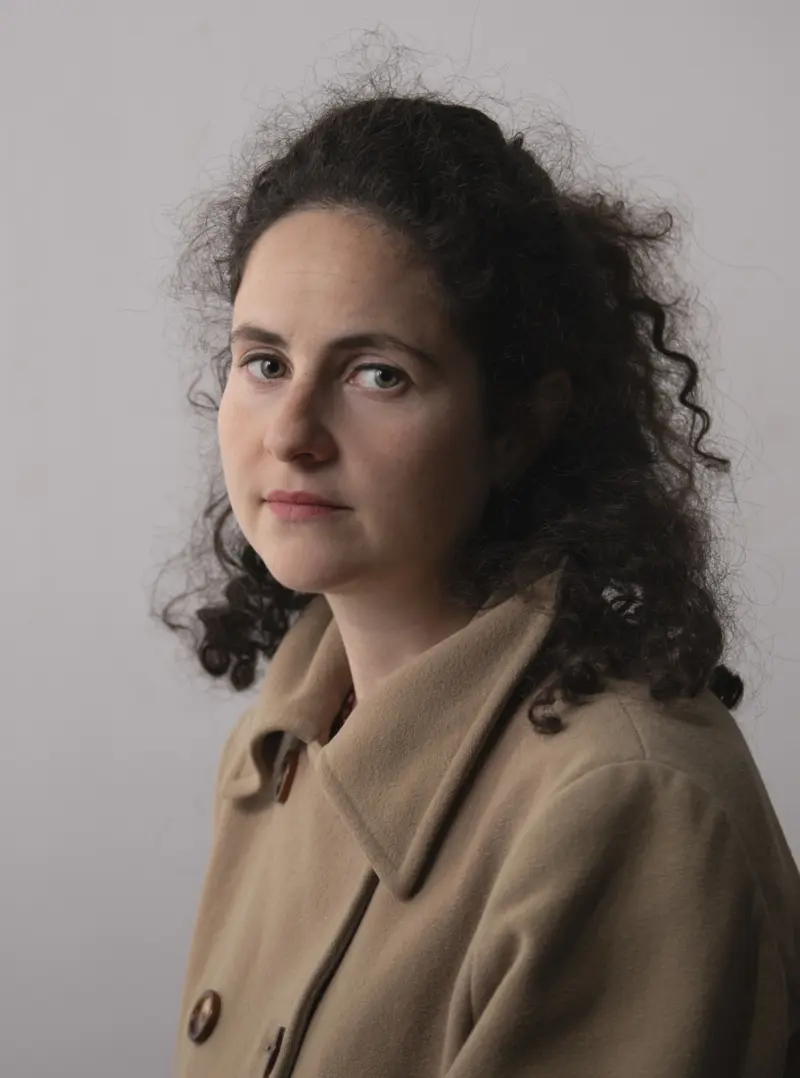
(ES) Noémie Berz (1994) es una pianista, fortepianista y clavecinista francesa con un enfoque multidisciplinario que integra la música con otras formas de arte. Tras obtener una licenciatura en piano en el Pôle Supérieur de Paris bajo la enseñanza de Romain Descharmes, decidió especializarse en interpretación histórica. Realizó una maestría en pedagogía musical en la Musikhochschule Freiburg con Tomoko Ogasawara y una maestría en interpretación histórica con Jean-Christophe Dijoux en la misma institución. También estudió clavecín con Aline Zylberajch, clavicordio con Benjamin Steens y fortepiano con Michel Gaechter en el Conservatorio de Estrasburgo. Su interés por la música de cámara la llevó a fundar el trío yidis Meydelech junto a Tabea Popien y Lucile Bailly-Gourevitch, con quienes ganó en 2023 el Special Jewish Music Prize en el Blockflötenfestival Nordhorn. Comprometida con la difusión de obras de compositoras, fundó el Duo Camille Claudel con Kevin Bourdat. Noémie es profesora de piano y clavecín en la Escuela de Música de Emmendingen, donde comparte su pasión por la enseñanza. Además, explora nuevas formas de expresión artística en el colectivo Les Alchimistes, fusionando música con literatura, teatro y artes visuales.
(EN) Noémie Berz (1994) is a French pianist, fortepianist, and harpsichordist with a multidisciplinary approach that integrates music with other art forms. After obtaining a bachelor's degree in piano from the Pôle Supérieur de Paris under the tutelage of Romain Descharmes, she decided to specialize in historical performance practice. She completed a master's degree in music pedagogy at the Musikhochschule Freiburg with Tomoko Ogasawara and a master's degree in historical performance with Jean-Christophe Dijoux at the same institution. She also studied harpsichord with Aline Zylberajch, clavichord with Benjamin Steens, and fortepiano with Michel Gaechter at the Conservatoire de Strasbourg. Her interest in chamber music led her to found the Yiddish trio Meydelech with Tabea Popien and Lucile Bailly-Gourevitch, with whom she won the Special Jewish Music Prize at the Blockflötenfestival Nordhorn in 2023. Committed to the dissemination of works by female composers, she founded the Duo Camille Claudel with Kevin Bourdat. Noémie is a piano and harpsichord teacher at the Emmendingen Music School, where she shares her passion for teaching. Furthermore, she explores new forms of artistic expression in the collective Les Alchimistes, fusing music with literature, theater and visual arts.
(DE) Noémie Berz (1994) ist eine französische Pianistin, Fortepianistin und Cembalistin mit einem multidisziplinären Ansatz, der Musik mit anderen Kunstformen integriert. Nach ihrem Bachelor-Abschluss in Klavier am Pôle Supérieur de Paris bei Romain Descharmes entschied sie sich für eine Spezialisierung auf historische Aufführungspraxis. Sie absolvierte einen Master in Musikpädagogik an der Musikhochschule Freiburg bei Tomoko Ogasawara und einen Master in historischer Aufführungspraxis bei Jean-Christophe Dijoux an derselben Institution. Sie studierte auch Cembalo bei Aline Zylberajch, Clavichord bei Benjamin Steens und Fortepiano bei Michel Gaechter am Conservatoire de Strasbourg. Ihr Interesse an Kammermusik führte zur Gründung des jiddischen Trios Meydelech zusammen mit Tabea Popien und Lucile Bailly-Gourevitch, mit denen sie 2023 den Special Jewish Music Prize beim Blockflötenfestival Nordhorn gewann. Engagiert in der Verbreitung von Werken von Komponistinnen gründete sie das Duo Camille Claudel mit Kevin Bourdat. Noémie ist Klavier- und Cembalolehrerin an der Musikschule Emmendingen, wo sie ihre Leidenschaft für das Unterrichten teilt. Darüber hinaus erforscht sie neue Formen des künstlerischen Ausdrucks im Kollektiv Les Alchimistes und verbindet Musik mit Literatur, Theater und Visual Arts.
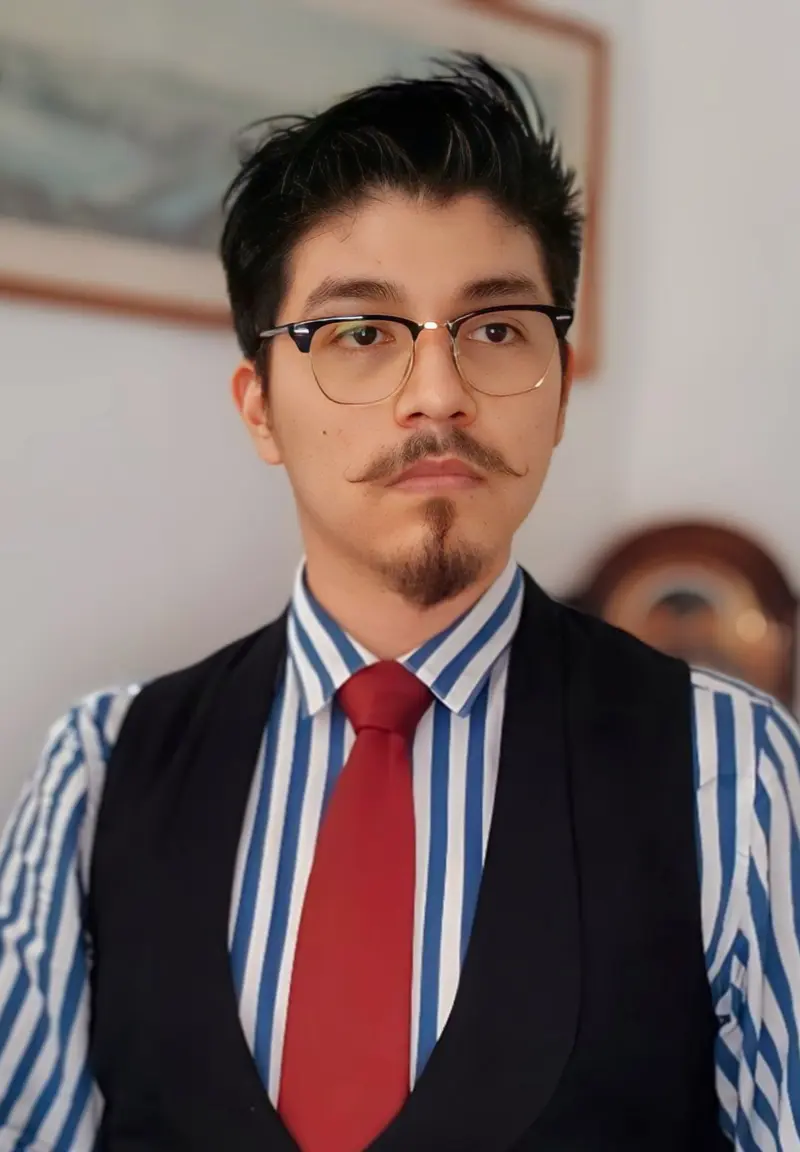
(ES) Pablo Cáceres Aranibar (1995) es un contrabajista, cantante, director y compositor boliviano especializado en interpretación históricamente informada. Estudió en la Schola Cantorum Basiliensis con David Sinclair, Kathleen Dineen y Markus Hünninger, y ha trabajado con figuras como Dominique Vellard, Amandine Beyer, Andreas Scholl y Andrea Marcon. Fundador del ensemble Epigonos Musicus/Tonkünstler, ha sido galardonado por la Musik-Akademie Basel y ha participado en festivales y simposios en Suiza, Austria y Francia.
Actualmente estudia musicología en la Universidad de Berna y es miembro de la Schweizerische Musikforschende Gesellschaft. Su investigación se centra en las prácticas interpretativas del siglo XIX y en el estudio de grabaciones históricas como fuentes interpretativas. En los últimos años ha promovido la obra del compositor Pedro Ximenez Abrill y Tirado, reestrenando su música en Suiza y Bolivia como parte de su compromiso con la recuperación del patrimonio musical andino.
(EN)
Pablo Cáceres Aranibar (1995) is a Bolivian double bassist, singer, conductor, and composer, specialized in historically informed performance. He studied at the Schola Cantorum Basiliensis under David Sinclair, Kathleen Dineen, and Markus Hünninger, and has collaborated with renowned artists such as Dominique Vellard, Amandine Beyer, Andreas Scholl, and Andrea Marcon. He is the founder of the ensemble Epigonos Musicus/Tonkünstler, awarded by the Musik-Akademie Basel for a musical video created during the pandemic.
He is currently pursuing musicology studies at the University of Bern and is a member of the Swiss Musicological Society. His research focuses on 19th-century performance practices in Europe and South America, as well as on early recordings as interpretive sources. In recent years, he has dedicated himself to the work of the Peruvian-Bolivian composer Pedro Ximenez Abrill y Tirado, reviving his music in concerts and festivals in both Switzerland and Bolivia, contributing to the recovery of this valuable Andean musical heritage.
(DE)
Pablo Cáceres Aranibar (1995) ist ein bolivianischer Kontrabassist, Sänger, Dirigent und Komponist mit Schwerpunkt auf historisch informierter Aufführungspraxis. Er studierte an der Schola Cantorum Basiliensis bei David Sinclair, Kathleen Dineen und Markus Hünninger und arbeitete mit renommierten Musiker*innen wie Dominique Vellard, Amandine Beyer, Andreas Scholl und Andrea Marcon zusammen. Er gründete das Ensemble Epigonos Musicus/Tonkünstler, das 2020 von der Musik-Akademie Basel für ein während der Pandemie produziertes Musikvideo ausgezeichnet wurde.
Derzeit studiert er Musikwissenschaft an der Universität Bern und ist Mitglied der Schweizerischen Musikforschenden Gesellschaft. Sein Forschungsschwerpunkt liegt auf der Aufführungspraxis des 19. Jahrhunderts in Europa und Südamerika sowie auf frühen Tonaufnahmen als interpretatorische Quellen. In den letzten Jahren widmet er sich intensiv dem Werk des peruanisch-bolivianischen Komponisten Pedro Ximenez Abrill y Tirado, dessen Musik er in Konzerten und Festivals in der Schweiz und in Bolivien wiederaufgeführt hat – ein Beitrag zur Wiederentdeckung dieses wertvollen andinen Musikschatzes.
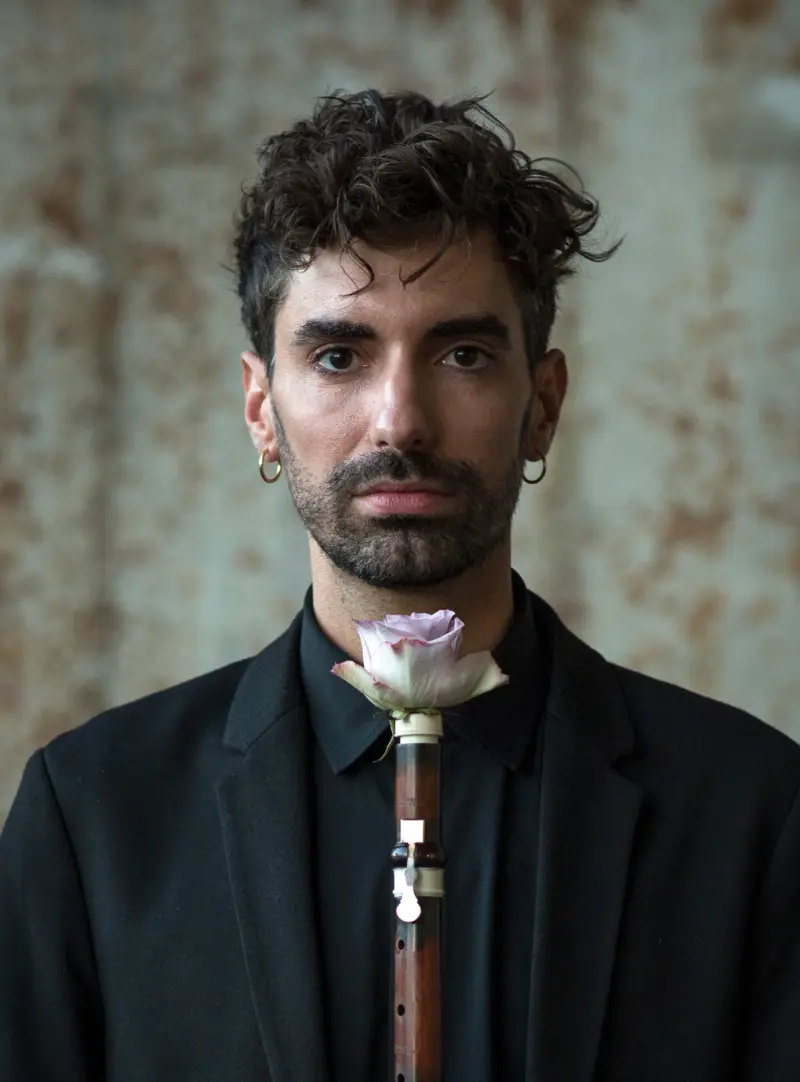
Pablo Gigosos (1992) es un flautista español de reconocimiento internacional, ganador del concurso “Internationalen Gebrüder Graun Wettbewerbs” en Bad Liebenwerda (Alemania) en 2018 y finalista en el concurso “Juventudes Musicales de España” en Barcelona el mismo año. Como solista de la Orchestre y Choeur de Chambre Colmar, ha sido invitado a tocar con importantes orquestas, incluyendo La Cetra, Los Elementos, Amsterdam Baroque bajo la batuta de Ton Koopman, Capriccio Barockorchester Basel, Berner Barockorchester, y muchas otras. Ha actuado en renombradas salas de conciertos en España, Alemania, Suiza, Francia, Bélgica y los Países Bajos. Gigosos ha grabado con la Orquesta Los Elementos obras como Donde hay violencia, no hay culpa y Vendado es amor, no es ciego de Josef de Nebra bajo el sello Glossa. Es director del ensemble BREZZA, con el que ha ganado varios premios internacionales, incluido el del Festival Oude Muziek de Utrecht 2024. Además, fue artista residente de la RHEINSBERGER HOFKAPELLE en 2023 y ha sido galardonado en prestigiosos concursos como el Concurso Internacional de Música Antigua de Gijón y el Festival Espurnes Barroques. Ha sido seleccionado como artista residente en el programa AlEnRUTa de la Sociedad de Artistas Intérpretes y Ejecutantes, y su trabajo ha sido destacado en diversas plataformas culturales de Europa. Su enfoque innovador y su pasión por la música histórica le han permitido destacarse en el ámbito de la música antigua.
(EN) Pablo Gigosos (1992) is an internationally recognized Spanish flautist, winner of the "Internationalen Gebrüder Graun Wettbewerbs" in Bad Liebenwerda (Germany) in 2018 and finalist in the "Juventudes Musicales de España" competition in Barcelona the same year. As a soloist with the Orchestre et Choeur de Chambre Colmar, he has been invited to play with important orchestras, including La Cetra, Los Elementos, Amsterdam Baroque under the baton of Ton Koopman, Capriccio Barockorchester Basel, Berner Barockorchester, and many others. He has performed in renowned concert halls in Spain, Germany, Switzerland, France, Belgium, and the Netherlands. Gigosos has recorded with the Orquesta Los Elementos works such as Donde hay violencia, no hay culpa and Vendado es amor, no es ciego by Josef de Nebra under the Glossa label. He is the director of the ensemble BREZZA, with which he has won several international awards, including that of the Festival Oude Muziek de Utrecht 2024. In addition, he was artist in residence at the RHEINSBERGER HOFKAPELLE in 2023 and has been awarded prizes in prestigious competitions such as the Concurso Internacional de Música Antigua de Gijón and the Festival Espurnes Barroques. He has been selected as artist in residence in the AlEnRUTa program of the Sociedad de Artistas Intérpretes y Ejecutantes, and his work has been highlighted on various cultural platforms in Europe. His innovative approach and passion for historical music have allowed him to stand out in the field of early music.
(DE) Pablo Gigosos (1992) ist ein international anerkannter spanischer Flötist, Gewinner des „Internationalen Gebrüder Graun Wettbewerbs“ in Bad Liebenwerda (Deutschland) im Jahr 2018 und Finalist des Wettbewerbs „Juventudes Musicales de España“ in Barcelona im selben Jahr. Als Solist des Orchestre et Choeur de Chambre Colmar wurde er eingeladen, mit bedeutenden Orchestern zu spielen, darunter La Cetra, Los Elementos, Amsterdam Baroque unter der Leitung von Ton Koopman, Capriccio Barockorchester Basel, Berner Barockorchester und vielen anderen. Er trat in renommierten Konzertsälen in Spanien, Deutschland, der Schweiz, Frankreich, Belgien und den Niederlanden auf. Gigosos hat mit dem Orchester Los Elementos Werke wie Donde hay violencia, no hay culpa und Vendado es amor, no es ciego von Josef de Nebra unter dem Label Glossa aufgenommen. Er ist Leiter des Ensembles BREZZA, mit dem er mehrere internationale Preise gewonnen hat, darunter den des Festival Oude Muziek de Utrecht 2024. Darüber hinaus war er 2023 Residenzkünstler der RHEINSBERGER HOFKAPELLE und wurde bei renommierten Wettbewerben wie dem Concurso Internacional de Música Antigua de Gijón und dem Festival Espurnes Barroques ausgezeichnet. Er wurde als Residenzkünstler im Programm AlEnRUTa der Sociedad de Artistas Intérpretes y Ejecutantes ausgewählt, und seine Arbeit wurde auf verschiedenen Kulturplattformen in Europa hervorgehoben. Sein innovativer Ansatz und seine Leidenschaft für historische Musik haben es ihm ermöglicht, sich im Bereich der Alten Musik hervorzutun.
.webp)
(ES) Sophia Mücke (2000), violinista suiza-alemana especializada en música barroca, ha dedicado su vida a la interpretación históricamente informada desde su adolescencia. Ganadora del Concurso Suizo de Música Joven, participó en el Festival Yehudi Menuhin en Gstaad, donde consolidó su interés por la música antigua. Tras obtener su licenciatura en la Schola Cantorum Basiliensis con la profesora Leila Schayegh, actualmente continua sus estudios en la Royal Academy of Music de Londres con Pavlo Beznosiuk y Nicolette Moonen. Como miembro del conjunto Musica Basiliensis, ha desarrollado proyectos innovadores, incluyendo talleres orquestales para músicos aficionados. Sophia ha actuado con orquestas especializadas como Zurich Baroque Orchestra, La Chapelle Ancienne e Il Pettirosso. En 2023, participó en las Jornadas Internacionales del Barroco en la Abadía de Melk bajo la dirección de Stefan Gottfried (Concentus Musicus Wien). Ha colaborado con reconocidos directores y músicos, entre ellos Francesco Corti, René Jacobs y John Butt. Además, ha recibido becas y reconocimientos de la Fundación Friedl Wald (Suiza) y es académica de la Orquesta del Siglo de las Luces en el Reino Unido. Con una sólida trayectoria artística, Sophia continúa destacándose en el ámbito de la música antigua, combinando tradición y creatividad.
(EN) Sophia Mücke (2000), a Swiss-German violinist specializing in Baroque music, has dedicated her life to historically informed performance since her adolescence. Winner of the Swiss Youth Music Competition, she participated in the Yehudi Menuhin Festival in Gstaad, where her interest in early music was solidified. After obtaining her bachelor's degree at the Schola Cantorum Basiliensis with Professor Leila Schayegh, she is currently continuing her studies at the Royal Academy of Music in London with Pavlo Beznosiuk and Nicolette Moonen. As a member of the ensemble Musica Basiliensis, she has developed innovative projects, including orchestral workshops for amateur musicians. Sophia has performed with specialized orchestras such as the Zurich Baroque Orchestra, La Chapelle Ancienne, and Il Pettirosso. In 2023, she participated in the International Baroque Days at the Melk Abbey under the direction of Stefan Gottfried (Concentus Musicus Wien). She has collaborated with renowned conductors and musicians, including Francesco Corti, René Jacobs, and John Butt. In addition, she has received scholarships and awards from the Friedl Wald Foundation (Switzerland) and is an academician of the Orchestra of the Age of Enlightenment in the United Kingdom. With a solid artistic career, Sophia continues to excel in the field of early music, combining tradition and creativity.
(DE) Sophia Mücke (2000), eine schweizerisch-deutsche Geigerin, die sich auf Barockmusik spezialisiert hat, widmet ihr Leben seit ihrer Jugend der historisch informierten Aufführungspraxis. Als Gewinnerin des Schweizerischen Jugendmusikwettbewerbs nahm sie am Yehudi Menuhin Festival in Gstaad teil, wo sich ihr Interesse an Alter Musik festigte. Nach ihrem Bachelor-Abschluss an der Schola Cantorum Basiliensis bei Professorin Leila Schayegh setzt sie derzeit ihr Studium an der Royal Academy of Music in London bei Pavlo Beznosiuk und Nicolette Moonen fort. Als Mitglied des Ensembles Musica Basiliensis hat sie innovative Projekte entwickelt, darunter Orchesterworkshops für Laienmusiker. Sophia ist mit spezialisierten Orchestern wie dem Zurich Baroque Orchestra, La Chapelle Ancienne und Il Pettirosso aufgetreten. Im Jahr 2023 nahm sie an den Internationalen Barocktagen im Stift Melk unter der Leitung von Stefan Gottfried (Concentus Musicus Wien) teil. Sie hat mit renommierten Dirigenten und Musikern zusammengearbeitet, darunter Francesco Corti, René Jacobs und John Butt. Darüber hinaus hat sie Stipendien und Auszeichnungen der Friedl Wald Stiftung (Schweiz) erhalten und ist Akademistin des Orchestra of the Age of Enlightenment im Vereinigten Königreich. Mit einer soliden künstlerischen Laufbahn behauptet sich Sophia weiterhin im Bereich der Alten Musik und verbindet Tradition und Kreativität.
“El concierto fue un momento de desconexión de la realidad para tener una inmersión en el arte y trabajo de grandes artistas que supieron transportar a lo que deseaban transmitir. Muy buena presentación de dos grandes profesionales en sus áreas.”



PROGRAM
MÚSICA INMORTAL 2023
MÚSICA INMORTAL 2024
MÚSICA INMORTAL 2025
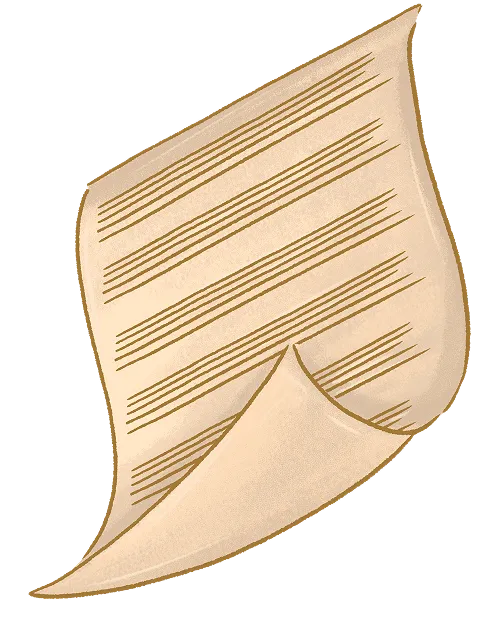
En el marco de la gira internacional de conciertos MÚSICA INMORTAL: ENTRE LOS ALPES Y LOS ANDES, el ensamble Epigonos Musicus/Tonkünstler – un sexteto conformado por 2 traversos, 2 violines, violonchelo y contrabajo (y voz) – presenta un repertorio casi completamente olvidado de Felix Mendelssohn Bartholdy, Pedro Ximenez Abrill Tirado, así como Ranz des Vaches de los Alpes y Yaravíes de los Andes, interpretado con instrumentos originales del siglo XIX.
Este concierto interactivo y didáctico une sonido, historia y cultura, superando la distancia habitual entre el escenario y el público.
As part of the international concert tour MÚSICA INMORTAL: ENTRE LOS ALPES Y LOS ANDES (IMMORTAL MUSIC: BETWEEN THE ALPS AND THE ANDES), the ensemble Epigonos Musicus/Tonkünstler – a sextet consisting of 2 traversi, 2 violins, cello, and double bass (and voice) – presents a nearly forgotten repertoire by Felix Mendelssohn Bartholdy, Pedro Ximenez Abrill Tirado, as well as Ranz des Vaches from the Alps and Yaravíes from the Andes – performed on original 19th-century instruments.
This interactive and educational concert combines sound, history, and culture, bridging the usual gap between stage and audience.
(ES) El programa de MÚSICA INMORTAL: YARAVÍ, ENTRE BEETHOVEN Y LOS ANDES consta de varios "ayres" bolivianos (dos Cantos Patrióticos, dos Cuecas, un Vals y siete Yaravíes), todos compiladas en varios países del mundo (Alemania, Bélgica, Bolivia y España). Estos doce ayres se intercalaron entre los tres movimientos de la "Waldsteinsonate" de Ludwig van Beethoven, con la intención de hacer una alusión a la enorme importancia de estas obras, poniéndolas a la altura de un compositor "inmortal" para la historia de la música occidental, como lo es Ludwig van Beethoven.
(EN) The program of MÚSICA INMORTAL: YARAVÍ, ENTRE BEETHOVEN Y LOS ANDES (IMMORTAL MUSIC: YARAVÍ, BETWEEN BEETHOVEN AND THE ANDES) consists of several Bolivian ayres (two Patriotic Songs, two Cuecas, one Waltz, and seven Yaravíes), all compiled in various countries around the world (Germany, Belgium, Bolivia, and Spain). These twelve ayres were interwoven between the three movements of Ludwig van Beethoven’s Waldstein Sonata, with the intention of highlighting the profound importance of these pieces by placing them on par with an "immortal" composer in Western music history such as Ludwig van Beethoven.
(DE) Das Programm von MÚSICA INMORTAL: YARAVÍ, ENTRE BEETHOVEN Y LOS ANDES (UNSTERBLICHE MUSIK: YARAVÍ, ZWISCHEN BEETHOVEN UND DEN ANDEN) besteht aus mehreren bolivianischen „Ayres“ (zwei patriotische Gesänge, zwei Cuecas, ein Walzer und sieben Yaravíes), die in verschiedenen Ländern der Welt (Deutschland, Belgien, Bolivien und Spanien) gesammelt wurden. Diese zwölf Ayres wurden zwischen die drei Sätze der „Waldstein-Sonate“ von Ludwig van Beethoven eingefügt – mit der Absicht, auf die enorme Bedeutung dieser Werke hinzuweisen, indem man sie auf eine Ebene mit einem „unsterblichen“ Komponisten der westlichen Musikgeschichte wie Ludwig van Beethoven stellt.
(ES) El programa de MÚSICA INMORTAL: YARAVÍ, ENTRE MOZART Y LOS ANDES consistió de varios "ayres" bolivianos (cinco yaravíes, dos tristes, cinco danzas y otras varias obras con “ayres bolivianos”), todos recopilados de varias Bibliotecas y Archivos en Alemania, Bélgica, Bolivia, Estados Unidos y Suiza por Pablo Cáceres Aranibar. Estos ayres se intercalaron entre los tres movimientos de la Sonta No. 12 en Fa mayor (K. 332) de Wolfgang Amadeus Mozart, con la intención de hacer una alusión a la enorme importancia de estas obras, poniéndolas a la altura de un compositor "inmortal" para la historia de la música occidental, como lo es Mozart.
(EN) The program of MÚSICA INMORTAL: YARAVÍ, ENTRE MOZART Y LOS ANDES (IMMORTAL MUSIC: YARAVÍ, BETWEEN MOZART AND THE ANDES) consisted of several Bolivian "ayres" (five yaravís, two tristes, five dances, and other works with "Bolivian ayres"), all compiled by Pablo Cáceres Aranibar from various libraries and archives in Germany, Belgium, Bolivia, the United States, and Switzerland. These ayres were interspersed between the three movements of Wolfgang Amadeus Mozart’s Sonata No. 12 in F major (K. 332), with the intention of alluding to the great importance of these works, placing them on the same level as an "immortal" composer in the history of Western music, such as Mozart.
(DE) Das Programm von MÚSICA INMORTAL: YARAVÍ, ENTRE MOZART Y LOS ANDES (UNSTERBLICHE MUSIK: YARAVÍ, ZWISCHEN MOZART UND DEN ANDEN) bestand aus mehreren bolivianischen „Ayres“ (fünf Yaravíes, zwei Tristes, fünf Tänze und weitere Werke mit „bolivianischen Ayres“), die alle von Pablo Cáceres Aranibar in verschiedenen Bibliotheken und Archiven in Deutschland, Belgien, Bolivien, den USA und der Schweiz gesammelt wurden. Diese Ayres wurden zwischen die drei Sätze der Sonate Nr. 12 in F-Dur (K. 332) von Wolfgang Amadeus Mozart eingefügt, mit der Absicht, auf die grosse Bedeutung dieser Werke hinzuweisen und sie auf die Stufe eines „unsterblichen“ Komponisten der westlichen Musikgeschichte zu stellen – wie Mozart es ist.




(EN) Support a unique, non-profit cultural project between Switzerland and Bolivia – especially now, when your help can make a decisive difference!
An application has been submitted to the tax authorities of the Canton of Zurich to make donations to the association tax-deductible.
(DE) Unterstützen Sie ein einzigartiges, gemeinnütziges Kulturprojekt zwischen der Schweiz und Bolivien – gerade jetzt, wo Ihre Hilfe den entscheidenden Unterschied machen kann!
Bei den Steuerbehörden des Kantons Zürich wurde ein Antrag auf Abziehbarkeit der Zuwendungen an den Verein eingereicht.



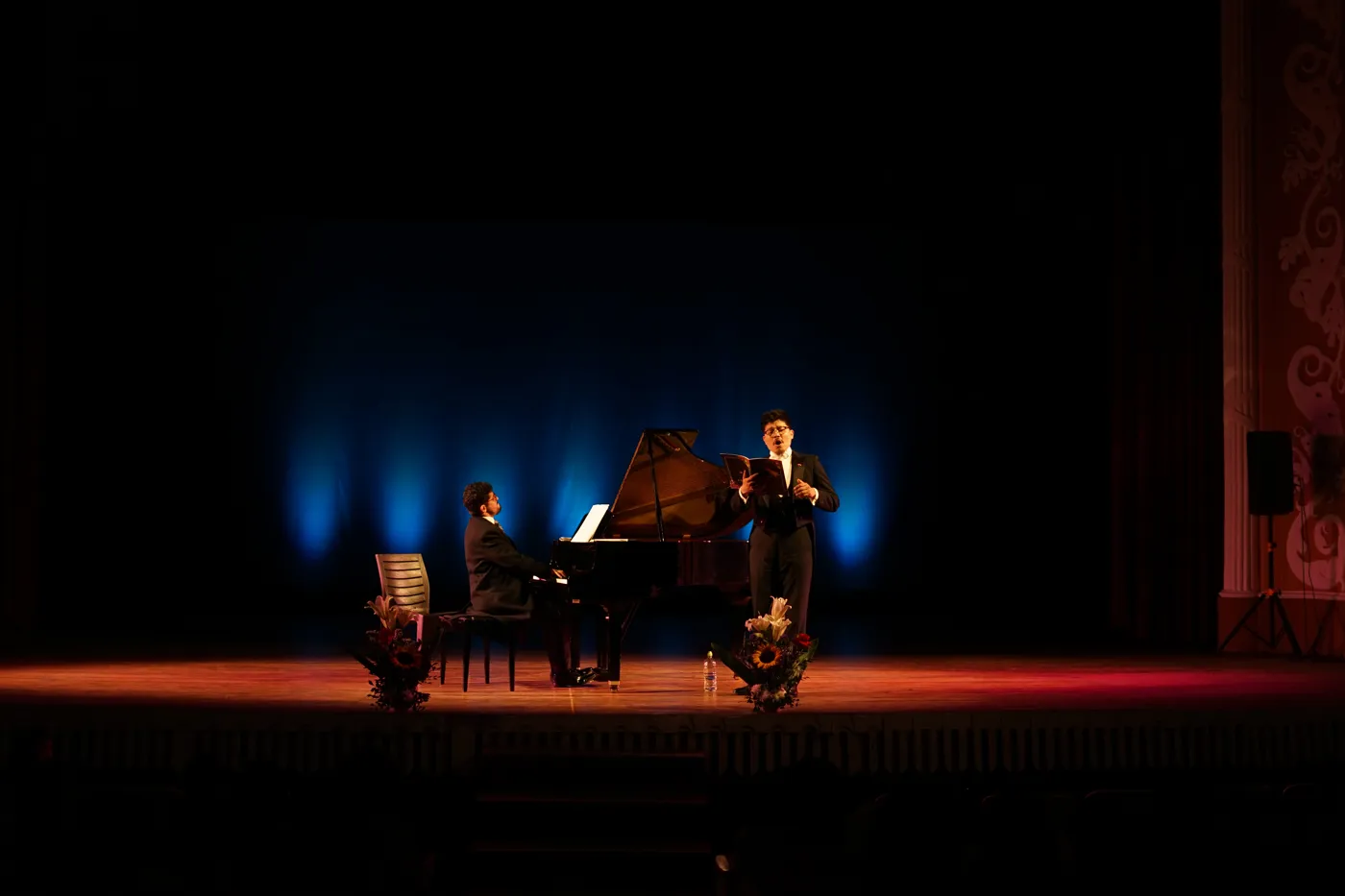
.webp)
.webp)
.webp)
.webp)
